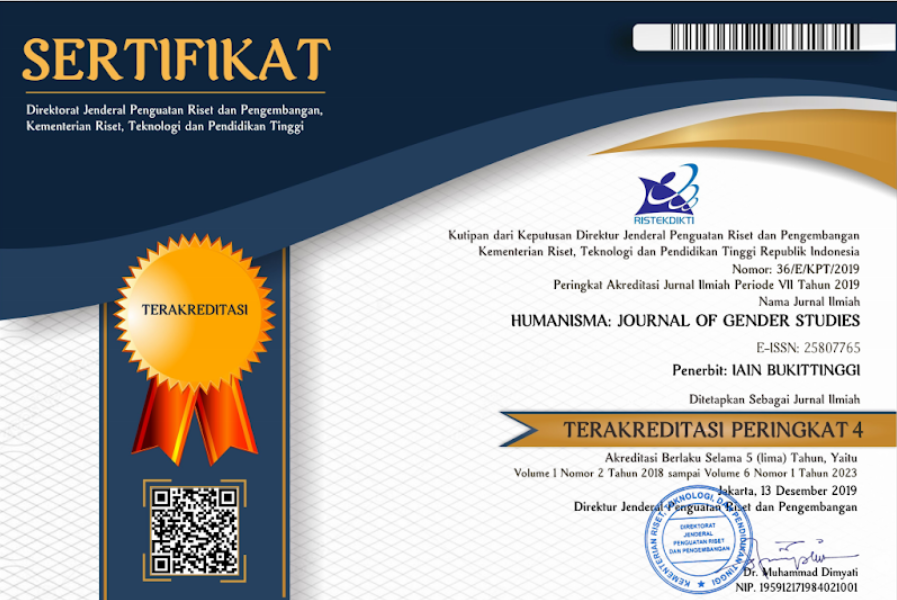Pemahaman Gender PNS di Lingkungan Dinas Pemberdayaan Perempuan dan Perlindungan Anak Pemerintah Daerah Kabupaten Bengkalis
DOI:
https://doi.org/10.30983/humanisme.v4i1.2669Keywords:
Gender, Women empowerment, child protection, PNS, BengkalisAbstract
References
Prosedur Penelitian. (1991). Jakarta: Renika Cipta.
Faqih, M. (2007). Analis Gender dan Transformasi Sosial, Pendekatan. Jogjakarta: Pustaka Pelajar.
Faqih, M. (2007). Analis Gender dan Transformasi Sosial, Pendekatan. . Jogjakarta: Pustaka Pelajar.
Maslamah, & Muzani, S. (2014). Konsep-konsep tentang Gender Perspektif Islam. Sawwa-Volume 9, Nomor 2, 276.
Maslamah, & Muzani, S. (2014). Konsep-Konsep Tentang Gender Perspektif Islam. SAWWA Volume 9, Nomor 2, 279.
Nizar, S., & dkk. (2016). Pedoman Penulisan SKRIPSI Sekolah Tinggi Agama Islam Negeri (STAIN) Bengkalis. Bengkalis: STAIN Bengkalis.
Puspitawati, H. (2012). Teori dan Analisis Gender, Gender dan Keluarga: Konsep dan Realita di Indonesia. Bogor: PT. IPB Press.
Puspitawati, H. (2013). Teori Dan Analisis Gender, Departemen Ilmu Keluarga dan Konsumen Fakultas Ekologi Manusia. Institut Pertanian Bogor, 3-4.
Rusli, M. (2011). Konsep Gender Dalam Islam. Jurnal Ilmiah Kajian Gender, Kafa’ah Volume 1 No. 2, 152.
Sudijono, A. (2007). Pengantar Statistik Pendidikan. Jakarta: PT. Raja Gravindo Persada.
Sudijono, A. (2009). Pengantar Statistik Pendidikan. Jakarta: Raja Grafindi Prasada.
Suharsimi. ( 2014). Prosedur Penelitian: Suatu Pendekatan Praktik. Jakarta: Renika Cipta.
Sujarweni, V. (2014). Metodelogi Penelitian. Jogjakarta: PustakaBaruPres.
Umar, N. (2000). Gender Dalam Al-Qur’an. Jurnal Pemikiran Islam Tentang Pemberdayaan Perempuan, 27.
Umar, N. (2002). Qur’an untuk Perempuan . Jakarta: Jaringan Islam Liberal (JIL) dan Teater Utan Kayu.
Kementrian Negara Pemberdayaan Perempuan Republik Indonesia, Pembangunan manusia berwawasan
Downloads
Published
How to Cite
Issue
Section
Citation Check
License
Copyright (c) 2020 Mufaro’ah, Titin Sumarni

This work is licensed under a Creative Commons Attribution-ShareAlike 4.0 International License.
Authors who publish with this journal agree to the following terms:
- Authors retain copyright and grant the journal right of first publication with the work simultaneously licensed under a Creative Commons Attribution-ShareAlike 4.0. that allows others to share the work with an acknowledgment of the work's authorship and initial publication in this journal.
- Authors are able to enter into separate, additional contractual arrangements for the non-exclusive distribution of the journal's published version of the work (e.g., post it to an institutional repository or publish it in a book), with an acknowledgment of its initial publication in this journal.
- Authors are permitted and encouraged to post their work online (e.g., in institutional repositories or on their website) prior to and during the submission process, as it can lead to productive exchanges, as well as earlier and greater citation of published work (See The Effect of Open Access).



